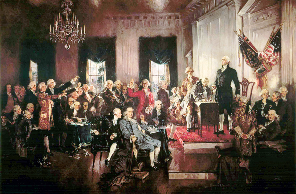
Well, that was a bit anticlimactic, wasn’t it? House Republicans had hoped that their scheme to force a vote repealing last year’s health care legislation would capture lightning in a bottle — giving voice to the anger of the Tea Party movement, fulfilling the GOP’s principal 2010 campaign promise, and ensuring that health care would continue pitting Americans against one another all the way to 2012. But in the wake of the Tucson shootings, as we continue to mourn the dead and root for Rep. Gabrielle Giffords’ remarkable recovery, the pettiness and empty symbolism of the repeal vote clearly ran counter to the national mood. And in the end, news of yesterday’s vote was buried beneath the pomp and circumstance (and immediacy, in terms of our economic future) of President Obama’s summit with Chinese president Hu Jintao.
Instead, House Republicans will have to be satisfied with the attention devoted to the other empty symbol of their rise to majority status: their insistence upon devoting a day of the House’s time to reading the U.S. Constitution aloud. It was a reminder that the Tea Party has spent the last two years complaining that every Democratic initiative of 2009-10, from the stimulus to health care to Obama propping his feet on the Oval Office desk, was a direct assault on that Constitution. (To help drive their point home, they turned every protest into a Revolutionary War re-enactment, complete with ”Don’t Tread On Me” flags and tinfoil tricorn hats and threats to ”water the tree of liberty.”) More important, reciting the Constitution was the culmination of the Teafoxlicans’ moderately successful efforts to claim the document as their own, and to portray liberalism as not merely ”socialism,” but unconstitutional socialism.
 Never mind the irony inherent in conservatives demanding fealty to (or even claiming an understanding of) the Constitution, after they spent the entire Bush administration cheering as our government ran amok over the Bill of Rights (torture, wiretapping, rendition, suppression of dissent, etc., etc.) and launched a couple of long-running foreign conflicts without obtaining congressional declarations of war. (That’s Article One, Section Eight, in case you’ve forgotten.) The most intriguing — and, really, hilarious — irony about this month’s dramatic reading was that Republicans, in their headlong rush to establish constitutional absolutism and strict-constructionism as their guiding principles, refused to read the actual … you know … Constitution in its entirety.
Never mind the irony inherent in conservatives demanding fealty to (or even claiming an understanding of) the Constitution, after they spent the entire Bush administration cheering as our government ran amok over the Bill of Rights (torture, wiretapping, rendition, suppression of dissent, etc., etc.) and launched a couple of long-running foreign conflicts without obtaining congressional declarations of war. (That’s Article One, Section Eight, in case you’ve forgotten.) The most intriguing — and, really, hilarious — irony about this month’s dramatic reading was that Republicans, in their headlong rush to establish constitutional absolutism and strict-constructionism as their guiding principles, refused to read the actual … you know … Constitution in its entirety.
They couldn’t. Because if they did read the whole thing — including those uncomfortable parts about slavery being okey-dokey, and blacks counting as three-fifths of a person, and indirect election of senators, and property ownership (including a penis) being required to vote, and all that — they might have to face the fact that for 220 years we’ve treated the Constitution as a malleable document, open to interpretation and selective ignoring and wholesale change. Such a recognition just wouldn’t jibe with conservatives’ current fashion for constitutional sanctimony — using the document (and particularly the 10th Amendment) as an all-purpose weapon against perceived big-government tyrannies, and wrapping themselves up in arguments about ”the framers’ original intent” as a way of portraying themselves as more law-abiding, more freedom-loving, more founders-following, more American than their opponents.
Of course, we’ve seen conservatives play this sort of game before. For decades now, ever since a few leftists committed the cardinal sin of burning the American flag to protest the Vietnam War, racism, sexism, and other issues during the 1960s and ’70s, Republicans have found great success wrapping themselves in that flag. They’ve pimped it out at every opportunity in order to symbolize their supposedly superior patriotism — touring flag factories, adorning their ”news” channel’s onscreen logo — while forcing the left into a permanent defensive crouch, even when it comes to frivolities like lapel pins.
 Liberals largely respond either by taking the bait and playing defense, which never works, or by pretty much ceding the flag to the GOP. It is a sad fact that Republicans have succeeded in politicizing the flag to such an extent that progressives have been forced either to attempt to ”reclaim” it from its attachment to the conservative values we oppose, or else to downgrade it (in our own minds, at least) as a symbol of what is good and true about our nation. When we’ve chosen the latter course, we traditionally have fallen back on the Constitution as the still-universal evidence of American, yes, exceptionalism. It is probably the greatest governing document ever created, and — from a liberal perspective — the improvements made to it over time, via amendments and judicial review and landmark court decisions and whatnot, exemplify our nation’s ability to change, to progress, to make substantive strides along the way to becoming A More Perfect Union.
Liberals largely respond either by taking the bait and playing defense, which never works, or by pretty much ceding the flag to the GOP. It is a sad fact that Republicans have succeeded in politicizing the flag to such an extent that progressives have been forced either to attempt to ”reclaim” it from its attachment to the conservative values we oppose, or else to downgrade it (in our own minds, at least) as a symbol of what is good and true about our nation. When we’ve chosen the latter course, we traditionally have fallen back on the Constitution as the still-universal evidence of American, yes, exceptionalism. It is probably the greatest governing document ever created, and — from a liberal perspective — the improvements made to it over time, via amendments and judicial review and landmark court decisions and whatnot, exemplify our nation’s ability to change, to progress, to make substantive strides along the way to becoming A More Perfect Union.
Focusing on the Constitution also appeals to liberals because it is about ideas and ideals, not just nationalism. I’ve written about all this before, back when Obama’s failure to wear a flag pin created such a trumped-up furor during the ’08 campaign; I discussed it in terms conjured by a professor of mine at Penn, Carolyn Marvin, who posed the dichotomy of Constitution and flag as a metaphor for the mind-body problem. To oversimplify her thesis, one serves as the brains of the republic, the other as the body — beginning with the earliest symbolism imparted by paintings that depicted the flag emerging fully formed from Betsy Ross’ lap, as though a literal birth were taking place. Anyway, if there is to be tension between the mind and body, as a liberal I’ve long rationalized that it’s just as well if conservatives take the flag and leave us with the Constitution, for all the reasons enumerated above.
 Now, of course, conservatives believe they can (and must) hoard the Constitution as well. In the wake of their own failures of the last decade and their sweeping defeats in two election cycles, they sensed the need to find another way of marginalizing progressive policies — and Obama’s entire presidency, which many of them would have you believe is unconstitutional in itself. At the same time, they’ve found the Constitution a useful shield against accusations that they’re Just Saying No to Obama’s policies, without offering coherent alternatives. Better, I suppose, to hide behind a set of two-centuries-old ideas than to offer any new ones of your own.
Now, of course, conservatives believe they can (and must) hoard the Constitution as well. In the wake of their own failures of the last decade and their sweeping defeats in two election cycles, they sensed the need to find another way of marginalizing progressive policies — and Obama’s entire presidency, which many of them would have you believe is unconstitutional in itself. At the same time, they’ve found the Constitution a useful shield against accusations that they’re Just Saying No to Obama’s policies, without offering coherent alternatives. Better, I suppose, to hide behind a set of two-centuries-old ideas than to offer any new ones of your own.
But the Constitution over which Teafoxlicans now wish to claim dominance is not the one that’s flexible enough to invite interpretation and allow for progress (from the freeing of slaves to Brown v. Board of Education, from women’s suffrage to abortion rights, from the striking down of laws that banned interracial marriage and sodomy to the inevitable approval of same-sex marriage). No, conservatives demand that the government obey what they believe was the framers’ original intent — the words in the document itself, or at least as many of them as John Boehner is willing to have read aloud.
This strict-constructionist pageant of politicizing the Constitution may have reached its apex with the recitation in the House, but it began with the Tea Party protests and, before that, with years of rants about ”judicial activism” that supposedly has betrayed the founding fathers’ virtuous (and apparently infallible) intentions. The trouble with such absolutism is not just that it requires ignoring the many ways in which the founders were, indeed, fallible; it also requires ignoring some of the wording that directly pertains to the Constitution’s flexibility, and it requires utterly (and ironically) ignoring the history of the document’s creation.
If you remember that history, you know that the phrasing of the 10th Amendment was the subject of considerable consternation among the founders. Article One, Section Eight (mentioned above as it relates to war powers) also gives Congress the power ”to make all laws which shall be necessary and proper“ (my emphasis) to carrying out the Constitution’s other instructions — a phrase that some framers found dangerous because it seemed to give Congress an unlimited mandate. To tame that wild beast a little bit, states’-rights advocates pressed for inclusion of the 10th Amendment, which reads, ”The powers not delegated to the United States by the Constitution, nor prohibited by it to the States, are reserved to the States respectively, or to the people.” During debate on the amendment, those same advocates pushed hard to include the word ”expressly” — i.e., ”powers not expressly delegated to the United States” — which would have made the Amendment similar to a clause that had severely limited federal power under the ineffective Articles of Confederation. That word was rejected, however, and the imprecision of the 10th Amendment has served the nation remarkably well through the years, from John Marshall to … at long last … the previous Congress seizing the reins on health-care reform.
 Of course, it remains to be seen how much of last year’s legislation will survive the legal challenges currently working their way through the courts. Conservatives insist that the 10th Amendment precludes such elements as the individual mandate to purchase insurance; Democrats, and most constitutional scholars, believe there’s ample precedent to suggest that the phrasing of the ”commerce clause” in Article One, along with the ”necessary and proper” clause, give Congress the power to regulate a national industry like health care pretty much any way it wants. As usual, such questions eventually will be decided on the whims of the nation’s second-most (or perhaps first-most) powerful man, Justice Anthony Kennedy.
Of course, it remains to be seen how much of last year’s legislation will survive the legal challenges currently working their way through the courts. Conservatives insist that the 10th Amendment precludes such elements as the individual mandate to purchase insurance; Democrats, and most constitutional scholars, believe there’s ample precedent to suggest that the phrasing of the ”commerce clause” in Article One, along with the ”necessary and proper” clause, give Congress the power to regulate a national industry like health care pretty much any way it wants. As usual, such questions eventually will be decided on the whims of the nation’s second-most (or perhaps first-most) powerful man, Justice Anthony Kennedy.
In the meantime, as Republicans continue to press their supposed superiority when it comes to all things patriotic and moral and freedom-loving, it’s interesting to note that ”The Constitution Tells Me So” has largely replaced ”The Bible Tells Me So” as the state-of-the-art absolutist argument of mainstream Republicanism. Both are intended to cut off debate, rather than to encourage it — after all, who wants to be seen as anti-Constitution, any more than he wants to be seen as anti-Bible? Yet, as an impediment to progress toward equality and real individual rights, this new absolutism is unlikely to prove any more successful than the old one over the long term. After all, times change — and just as our attitudes have shifted dramatically concerning biblical precepts on stoning and slavery and bigotry and pork, our interpretations of the Constitution inevitably will continue to shift as well. And no matter what strict-constructionists say, that’s exactly — nay, expressly — how the framers intended it to be.





Comments